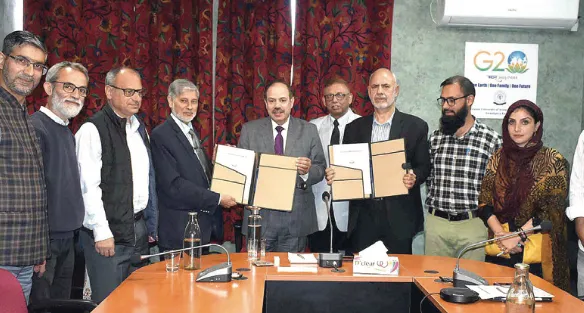Awantipora, Oct 16: The Islamic University of Science and Technology (IUST), Awantipora, and the Nepal Centre for Disaster Management (NCDM), Kathmandu, Nepal, signed a memorandum of understanding (MoU) to strengthen research collaboration in the field of disaster management in the region.
The signing took place in the presence of Vice-Chancellor Prof Shakil A Romshoo. The MoU was signed by the Dean of Academic Affairs at IUST, Prof Ayaz Hassan Moon, and the President of NCDM, Prof Bishal Nath Upreti.
Prof Romshoo, a member of several policymaking committees on climate change and disaster management at the state, national, and international levels, described the collaboration as crucial given the impending disaster vulnerabilities in the region. He emphasized the significance of capacity building and comprehensive hands-on training in disaster preparedness, as well as cutting-edge research in disaster sciences. He added that IUST will facilitate networking and assist in building meaningful alliances and consortia among academia addressing global challenges, as well as link with national and international agencies for the benefit of society.
Prof. Upreti applauded the proactive interventions undertaken by the university under the leadership of Prof Romshoo for the development of a strategic research and academic framework. Also present during the signing ceremony were Registrar Prof Abdul Wahid, Dean of Research Prof Sheikh Javid Ahmed, Prof Shakeel Ahmad, Consultant at IUST, Dean of the School of Health Sciences Prof Mohd Ayub Qadri, Dr Irfan Maqbool Bhat, Coordinator of CDRR, and Waseem Qader, Assistant Professor at CDRR. The program was coordinated by Dr Monisa Qadiri, Officer In-Charge of the International Affairs Office at IUST.
According to the statement, the MoU will facilitate the optimal and efficient use of resources and expertise, enable exchange programmes, and promote the sharing of equipment, facilities, and infrastructure to enhance research and academic collaboration between J&K, India, and Nepal. Furthermore, it will encourage collaborative programmes in mutually beneficial areas, the mutual sharing of high-end instruments, and the joint organisation of conferences and other outreach initiatives.


